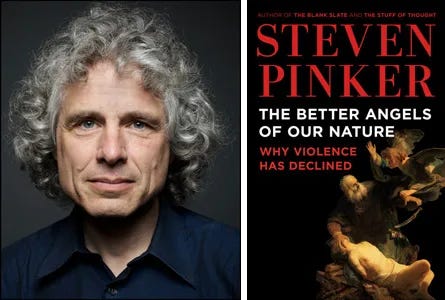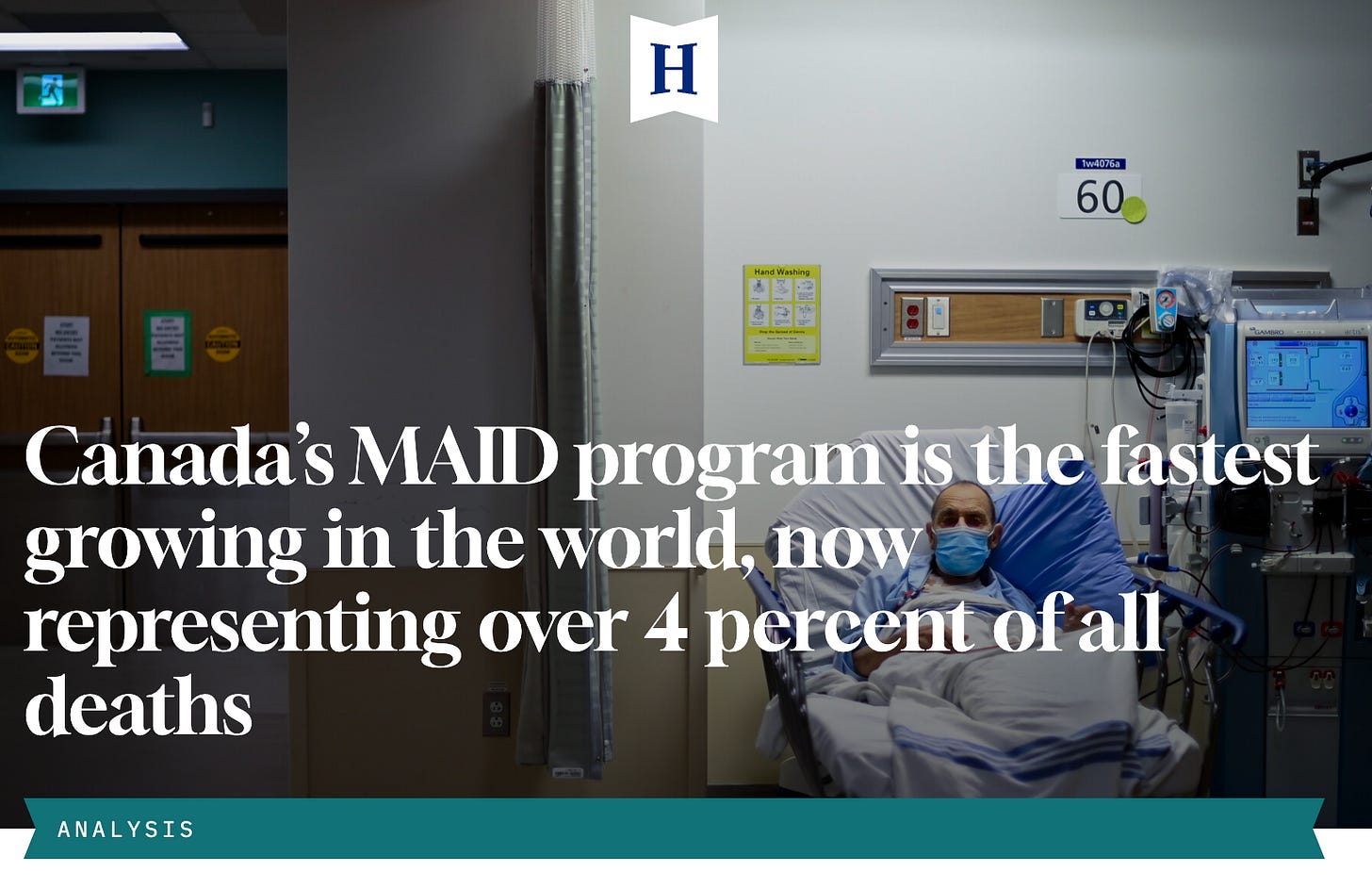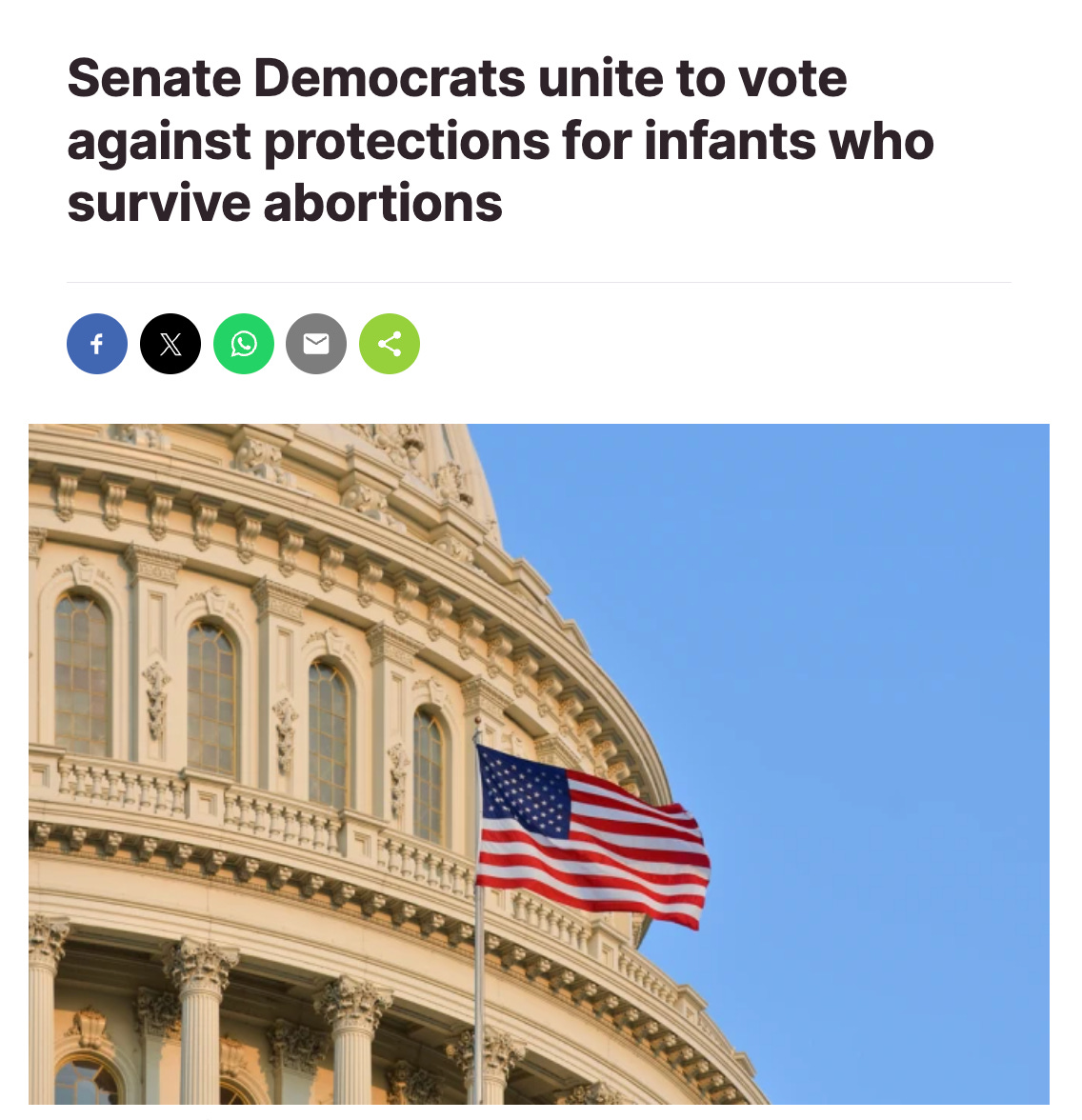Better Angels or False Prophets?
How the gospel of progress fails the voiceless and flatters the powerful.
While reading Tribe of Mentors (one of my favorite Tim Ferris books), I noticed a pattern. Again and again, the intellectuals featured in the book—people who shape culture, tech, policy, and philosophy—listed The Better Angels of Our Nature as one of the most influential books they’d ever read. Bill Gates called it “the most inspiring book” he’d ever read and Mark Zuckerberg made it a Year of Books pick. Intrigued, I picked it up with high expectations.
Steven Pinker is a Harvard psychologist with a compelling thesis: that violence has steadily declined throughout human history, and that we're living in the most peaceful, humane era the world has ever seen. It’s an optimistic, data-heavy, footnote-laden story about the rise of reason, science, and human empathy. And for a time, I was with him.
He chronicles war, torture, child abuse, slavery, and more—and shows how, over time, our collective moral instincts have supposedly matured. For hundreds of pages, I found myself nodding, encouraged even. Maybe we are making moral progress. Maybe, as Pinker claims, reason and humanism really have brought us closer to decency.
And then I turned the page and read this:
“This is not the place to discuss the morality of abortion, but the larger context of trends in violence can provide some insight into how people conceive of abortion.”
I stopped. Re-read it. Then again. I flipped back to see if I had missed something.
This is a book about the decline of violence. Written by a Harvard professor, Pulitzer finalist, and one of Time’s “100 Most Influential People in the World”. And here it was—an outright refusal to pass judgment on abortion. Not because he lacked information, but because acknowledging it might ruin the story.
How Pinker got there:
To give you some context, Pinker had just finished walking through the long history of infanticide. He celebrated how the West had supposedly turned a moral corner and begun to cherish children as full human beings. But then he had to confront an unavoidably brutal fact:
“Before turning to the bigger picture of the appreciation of children in the West, I must spend a few words on a more jaundiced view of the historical fate of infanticide. According to an alternative history, the major long-term trend in the West is that people have switched from killing children shortly after they are born to killing them shortly after they are conceived.”
An interesting qualifier, but he continues admitting:
“It is true that in much of the world today, a similar proportion of pregnancies end in abortion as the fraction that in centuries past ended in infanticide.”
I give him credit. He admitted it. We didn’t stop killing children. We just changed the timing.
Bafflingly, he even provides the numbers—1 million abortions in the U.S. (2003 data), 5 million in Europe, and over 11 million globally.
If Pinker were to update his numbers the worldwide total would now show 73 million in 2024 (the leading cause of death globally).
And then comes the most damning admission of them all:
“If abortion counts as a form of violence, the West has made no progress in its treatment of children… the moral state of the West hasn’t improved; it has collapsed.”
That’s not my accusation. That’s Pinker’s own summary—So what does he do with that insight? Nothing. It is at this point in the book that he inserts that moral equivocation: “This is not the place to discuss the morality of abortion”
He acknowledges the tradeoff. He names the shift from infanticide to abortion. But he refuses to confront its meaning. He slips back into language about consciousness and brain activity—philosophical abstractions that allow him to remain noncommittal.
And that’s where the mask slips. This isn’t about intellectual rigor. It’s all about narrative protection.
Pinker knows that if abortion is violence, his grand theory of moral progress collapses. And if the West hasn’t actually become more just or humane—if it has only disguised its violence to the unborn—then the myth of progress itself is threatened.
That myth is critical to many in the Ivy League ruling class. And that collapse would be catastrophic. Why? Because uninterrupted moral progress is sacred to them. If we aren't getting better—if we’re still capable of the same moral blindness as our ancestors—then the entire case for unquestionable “progress” crumbles. These are the same elites who tell us: Innovation is always good. Progress is always right. Everything traditional must be reimagined—including gender, family, and childhood itself.
Their entire identity is built on the idea that modernity is synonymous with morality—that the further we drift from tradition, the more enlightened we become. But if we’re just as capable of moral blindness, then that narrative falls apart.
Animals > Humans
And just when you think Pinker couldn’t be more disoriented, he tells you the worst thing he’s ever done. Spoiler alert: It is not that he chose to stay silent on mass abortion. It isn’t minimizing millions of unborn deaths a year.
No. It was this: “Let me tell you about the worst thing I have ever done... I had tortured an animal to death.”
A lab rat. In a behavioral experiment. He writes pages about the horror he felt. The guilt. The pain. He grieves the rat. Now, cruelty to animals is not a joke. And those who torture animals are worthy of our condemnation. But the unborn child? The one whose heart begins beating at 6 weeks? Whose body recoils from instruments? Who feels pain in the third trimester? Nothing.
He affirms animal rights as a marker of moral progress. He condemns cruelty to pigeons and lab mice. But when it comes to the unborn—no grieving. No guilt. No clarity. No courage.
Moral Decay
Pinker also insists that abortion hasn’t made society more accepting of death. Asserting that legal abortion hasn’t opened the door to broader moral decay. But the last few decades has proven otherwise.
Canada’s MAiD (assisted death) program is now the 6th leading cause of death. Laws are being debated to include mental illness and poverty as eligible “conditions” for admittance to the program.
In the U.S., lawmakers blocked a bill that would’ve required medical care for babies born alive after botched abortions.
Across Europe, debates over euthanizing disabled children are no longer theoretical but are happening in several EU nations.
We’ve traded intellectual clarity for therapeutic language. Violence for “choice.” Euthanasia for “compassion.” And still, the elites want to tell us that everything is getting better.
When Experts Trade Truth for Elite Affirmation
Let me be clear: not all experts are cowards. Not all scholars are dishonest. But we need to learn this: Many of the greatest evils of our time aren’t hiding behind ignorance. They hide behind credentials. Behind TED Talks. Behind Harvard chairs and best-selling books.
They thrive when everyday people who know better—stay silent. Because someone with a PhD told them, “It’s more complicated than that.”
But it’s not.
Life begins at conception.
It’s always wrong to kill the innocent.
Boys can’t become girls.
You don’t fix racism with more racism.
Borders aren’t bigotry.
And abortion is violence—no matter how cleverly you phrase it.
Clarity Is Courage
We complicate what we want to excuse. We nuance what we’re too afraid to confront. But evil doesn’t need your agreement. It only needs your silence.
We don’t need more data. We need more backbone.
A just society isn’t measured by how it treats the strong. It’s measured by how it treats the voiceless. The unborn. The elderly. The disabled. The invisible.
And one day, I believe, history will look back in horror at how we sacrificed them—while we called ourselves enlightened.
If this is what the better angels of our nature sound like…
Maybe those aren’t angels after all.
- Josh
Note: As always, if you purchase a book through one of these links, all proceeds will be given to groups serving their neighbors and building God’s Kingdom around the world.








